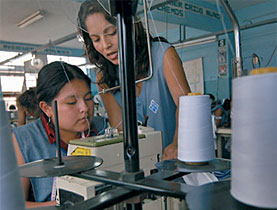
Parliament tackles labour accord and aid

A key labour agreement with the European Union and development aid are high on the agenda of the summer session of the Swiss parliament, now sitting in Bern.
The session opened a week earlier than usual owing to the Euro 2008 football championship being co-hosted by Switzerland and neighbours Austria from June 7.
Only the third and final week of the session will fall inside the championship but the agenda of meetings has been so arranged that football fans inside parliament will not miss a game.
In the House of Representatives, debate will centre on the continuation of the labour accord with the European Union – known as the free movement of people – and its extension to new EU members Bulgaria and Romania.
At stake is whether the two issues should be separated or be decided as a package.
The Slovene EU presidency issued a reminder to Switzerland on Tuesday that from the EU point of view the two issues were inseparable.
Failure to grant the same terms to Bulgaria and Romania would mean that all other bilateral accords of the first series would be suspended – these include overland transport and aviation, agriculture, public procurement, barriers to trade and research.
Two or one?
The foreign policy committee of the House has agreed with the government that there should be two separate decisions but the Senate, the chamber that represents the cantons, is in favour of a package.
Parliamentarian Geri Müller, who is president of the foreign affairs committee, noted that the government has promised that the continuation of the free movement of people accord could be put to a nationwide vote in 2009.
The accord has been in force since 2002.
Müller said it was a coincidence that the extension of the accord to Bulgaria and Romanian was now ready for discussion.
He added it was better to separate the two because the Swiss did not like package solutions.
However, the centre-right Radical parliamentarian Christa Markwalder said Switzerland could not negotiate with just 25 members of the EU but had to agree with all 27.
If the House and then the Senate decide to back the government and committee position, the rightwing Swiss People’s Party would launch a people’s initiative just against the extension of the labour accord to Bulgaria and Romania.
Otherwise, it will oppose the entire package.
Development aid
The continuation of Swiss development aid is also a key issue of discussion, including a new four-year framework credit.
The foreign affairs committee of the House wants money for developing countries to be increased to 0.7 per cent of GDP by the year 2015.
The government is asking for a credit of SFr5.3 billion ($5.16 billion) in the years 2009 to 2012 – SFr4.5 billion for the Swiss Agency for Development and Cooperation and SFr800 million for the State Secretariat for Economic Affairs.
According to the government, that represents about 0.4 per cent of GDP. The commission has accepted the credit but wants to gradually increase the sum.
From 2010, it would like to see 0.5 per cent of GDP flow into development aid, 0.6 per cent in 2010 and 0.7 per cent from 2015. The 0.7 per cent figure has been demanded by aid agencies and would comply with the United Nations Millennium Development Goals.
However, further credit is likely to face tough opposition in the House. The decision in the commission was extremely close.
swissinfo, based on an article in German by Jean-Michel Berthoud
Voters in 1992 narrowly rejected joining the European Economic Area treaty, a halfway house to EU membership.
Instead Switzerland and the EU concluded 16 bilateral accords, which came into force in 2002 (extended in 2006) and 2005 respectively. They mainly cover trade and labour as well as asylum, customs and tax issues.
Under the terms of the first package of bilateral treaties with Brussels, Switzerland can review the labour deal by mid-May 2009. Refusal to continue the deal would result in the whole set of accords being suspended.
Negotiations are underway on an electricity agreement. Switzerland also aims at concluding a free-trade accord on agriculture.
NGOs handed in a petition to the federal authorities on Monday with 201,679 signatures calling for Switzerland to spend more money on development aid.
The driving force behind it was an alliance called 0.7% – Gemeinsam gegen Armut (Together against Poverty), which includes more than 60 aid agencies, churches and associations.
The petition demands that development aid be increased from about 0.4% to 0.7% of GDP.

In compliance with the JTI standards
More: SWI swissinfo.ch certified by the Journalism Trust Initiative






























You can find an overview of ongoing debates with our journalists here . Please join us!
If you want to start a conversation about a topic raised in this article or want to report factual errors, email us at english@swissinfo.ch.